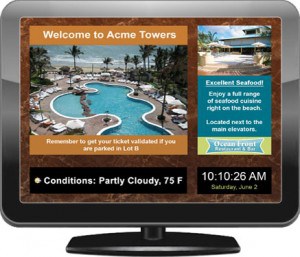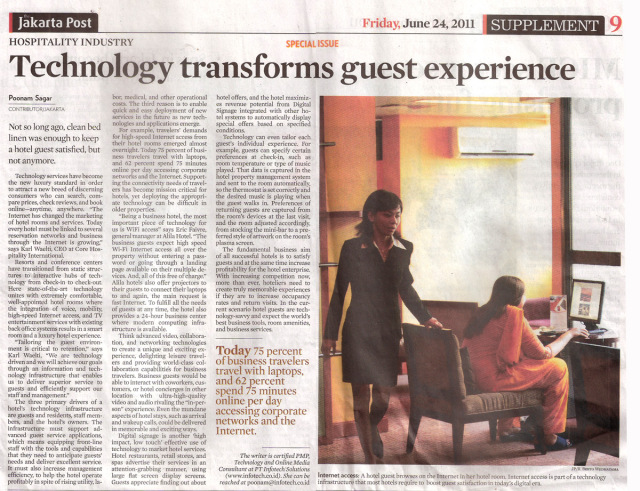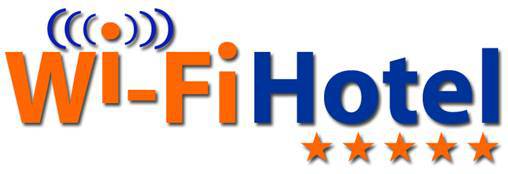Not so long ago, clean bed linen was enough to keep a hotel guest satisfied, but technology services have become the new luxury standard in order to attract a new breed of discriminating consumers who can search, compare prices, check reviews, and book online—anytime, anywhere.
“The Internet has changed the marketing of hotel rooms and services. Today every hotel must be linked to several reservation networks and business through the internet is growing,” says Karl Waelti, CEO at Core Hospitality International.
Resorts and conference centers have transitioned from static structures to interactive hubs of technology from check-in to check-out. Here state-of-the-art technology unites with extremely comfortable, well-appointed hotel rooms where the integration of voice, mobility, high-speed Internet access, and TV entertainment services with existing back office systems results in a smart room and a luxury hotel experience.
“Tailoring the guest environment is critical to retention,” says Karl Waelti, “We are technology driven and we will achieve our goals through an information and technology infrastructure that enables us to deliver superior service to guests and efficiently support our staff and management.”
The three primary drivers of a hotel’s technology infrastructure are guests and residents, staff members, and the hotel’s owners. The infrastructure must support advanced guest service applications, which means equipping front-line staff with the tools and capabilities that they need to anticipate guests’ needs and deliver excellent service. It must also increase management efficiency, to help the hotel operate profitably in spite of rising utility, labor, medical, and other operational costs. The third reason is to enable quick and easy deployment of new services in the future as new technologies and applications emerge.
For example, travelers’ demands for high-speed Internet access from their hotel rooms emerged almost overnight. Today 75 percent of business travelers travel with laptops, and 62 percent spend 75 minutes online per day accessing corporate networks and the Internet. Supporting the connectivity needs of travelers has become mission-critical for hotels, yet deploying the appropriate technology can be difficult in older properties.
“Being a business hotel, the most important piece of technology for us is WiFi access” says Eric Faivre, general manager at Alila Hotel. “The business guests expect Wi-Fi high-speed internet access all over the property without entering a password or going through a landing page available on their multiple devices. And, all of this free of charge.” Alila hotels also offer projectors to their guests to connect their laptops to and again, the main request is fast internet. To fulfill all the needs of guests at any time, the hotel also provides a 24-hour business center with modern computing infrastructure is available.
Think advanced video, collaboration, and networking technologies to create a unique and exciting experience, delighting leisure travelers and providing world-class collaboration capabilities for business travelers. Business guests would be able to interact with coworkers, customers, or hotel concierges in other locations with ultra-high-quality video and audio rivaling the in-person experience. Even the mundane aspects of hotel stays, such as arrival and wakeup calls, could be delivered in memorable and exciting ways.
 Digital signage is another ‘high impact, low touch‘ effective use of technology to market hotel services. Hotel restaurants, retail stores, and spas advertise their services in an attention-grabbing manner, using large flat screen display screens. Guests appreciate finding out about hotel offers, and the hotel maximizes revenue potential from Digital Signage integrated with other hotel systems to automatically display special offers based on specified conditions.
Digital signage is another ‘high impact, low touch‘ effective use of technology to market hotel services. Hotel restaurants, retail stores, and spas advertise their services in an attention-grabbing manner, using large flat screen display screens. Guests appreciate finding out about hotel offers, and the hotel maximizes revenue potential from Digital Signage integrated with other hotel systems to automatically display special offers based on specified conditions.
Technology can even tailor each guest’s individual experience. For example, guests can specify certain preferences at check-in, such as room temperature or type of music played. That data is captured in the hotel property management system and sent to the room automatically, so the thermostat is set correctly and the desired music is playing when the guest walks in. Preferences of returning guests are captured from the room’s devices at the last visit, and the room adjusted accordingly, from stocking the mini-bar to a preferred style of artwork on the room’s plasma screen.
The fundamental business aim of all successful hotels: satisfy guests and at the same time increase profitability for the hotel enterprise. With increasing competition now, more than ever, hoteliers need to create truly memorable experiences if they are to increase occupancy rates and return visits. In the current scenario hotel guests are technology-savvy and expect the world’s best business tools, room amenities, and business services.
As published in the Jakarta Post

By Poonam Sagar, certified PMP, Technology and Online Media Consultant at PT Infotech Solutions (www.infotech.co.id) an international IT firm empowering media broadcasters, content providers and distributors to optimize business processes with integrated, scalable and optimized IT solutions.Â





